[As I work full-time with Missionaries’ Kids, I mention MKs frequently in this article, but the truths I outline would apply to any young person navigating growing up in our complicated modern world–particularly if raised in an intensely religious environment.]
My goal in writing this article is not to shock. It isn’t to ruffle feathers. I write this because of the number of MKs I’ve worked with whose lack of information in the realm of sexuality has left them vulnerable or victimized. If this topic makes you uneasy—if words that pertain to different forms of sexual activity, responses and organs offend or discomfort you—you may be exactly the parents who need to read the following.
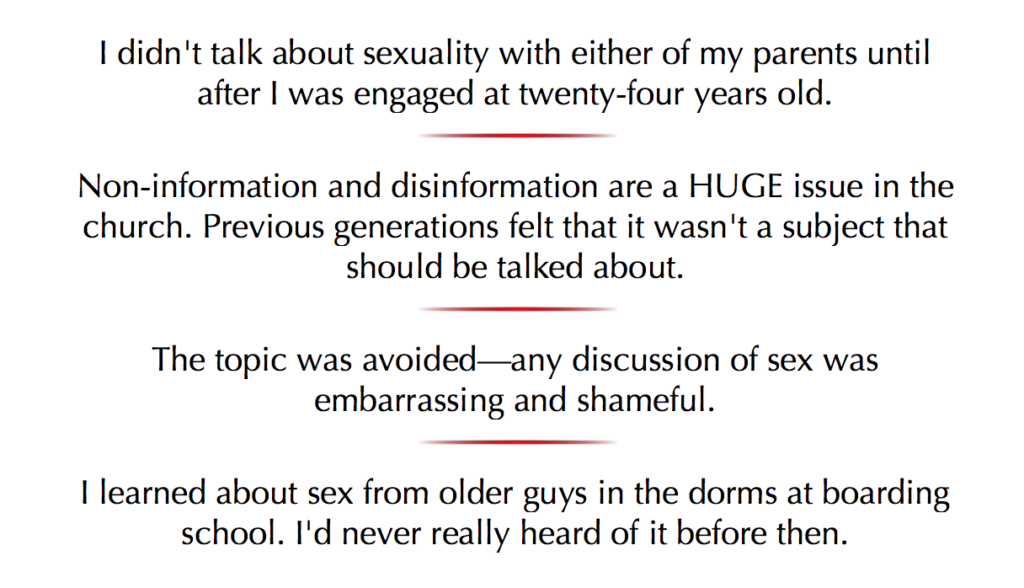 Why this exhortation to talk about sex? Because your children are already engaged in a life-shaping conversation on the topic. It is often explicit and starts as early as elementary school. If loving and unafraid parents don’t address the topic boldly, starting at a young age, MKs will frame their understanding of sexuality from the opinions of just-as-clueless peers, compassless celebrities and media that often function as extensions of the porn industry.
Why this exhortation to talk about sex? Because your children are already engaged in a life-shaping conversation on the topic. It is often explicit and starts as early as elementary school. If loving and unafraid parents don’t address the topic boldly, starting at a young age, MKs will frame their understanding of sexuality from the opinions of just-as-clueless peers, compassless celebrities and media that often function as extensions of the porn industry.
Missionary parents—you need to talk about sex.
And not just about the fact that it is a God-designed gift, beautiful and purposeful in its rightful context! If we’re not courageously and intentionally taking the lead in teaching young minds about the distortions of sexuality they’ll encounter in the world, we’re relinquishing this aspect of their personal, spiritual and social formation to forces outside our control.
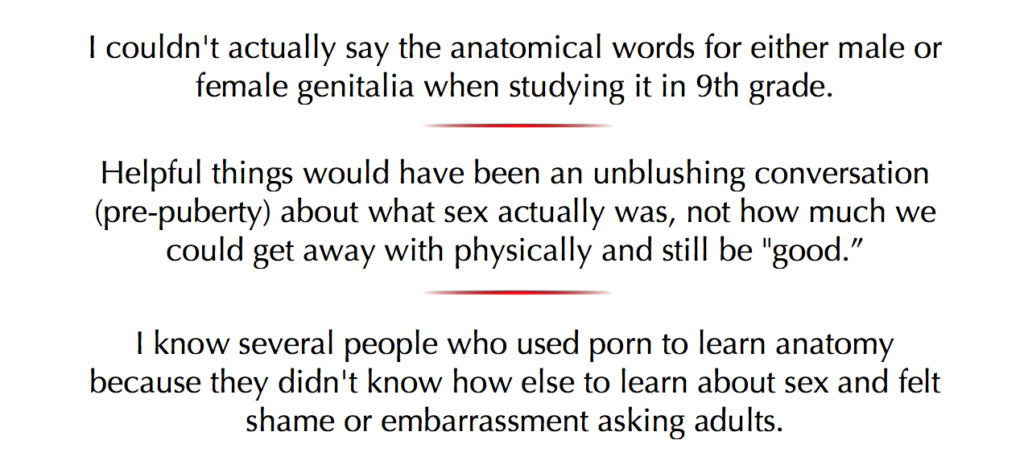
A brief (and incomplete) explanation of how we’ve gotten here:
The current cultural climate around sex in North America began a few decades ago. In the 60s and 70s, the Sexual Revolution and easy access to birth control began to move sexual experiences and experimentation out of the realm of the private or forbidden and into the realm of the casual and consequenceless.
In the 80s and later, TV sitcoms and dramas took the lead in “de-tabooing” words and topics that before then would have been unmentionable or at least deeply uncomfortable in many settings. Shows like “Friends” were among the first to humorize pornography, one-night stands and promiscuity, while Seinfeld openly discussed and laughed at things like involuntary erections.
The 90s further exacerbated the trend toward overt sexual vernacularization, notably with President Clinton’s infidelities making of oral sex a broadly discussed form of sexuality—whether more conservative families wanted to address it or not.
In the United States and Canada, we may have been slower in the realm of displaying nudity on mainstream television channels, but since the standards-flouting arrival of cable and streaming, shows that push boundaries in graphicness of content have flourished in the public sphere. That’s not even mentioning easy-access pornography, now freely viewable from devices most children and teens carry in their pockets.
Because of this normalization, we must boldly engage the topic of sex in the safe, nurturing context of our families.
IGNORANCE ISN’T BLISS—IT’S RISK.
Lack of awareness is not protective. The innocence of many of the MKs I’ve known, though laudable in the sense that they haven’t been exposed to some of the world’s debauchery, is something the devil himself is intent on exploiting.
The power—through knowledge—to identify, resist, and refute the lies of unthoughtful and unsafe sexuality is a crucial skillset to impart to developing humans.
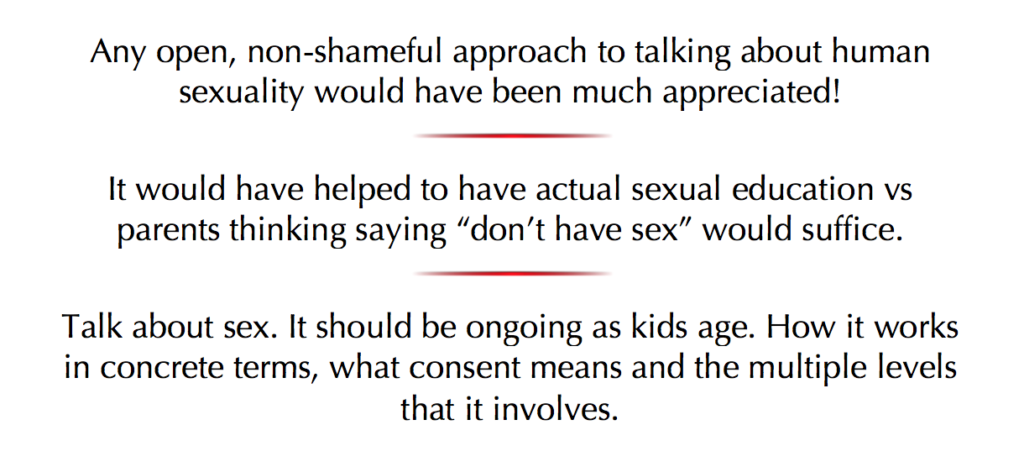
Regardless of where they live in the world today, your MKs are not sheltered. They are being—or will soon be—bombarded with messaging intended to confuse and mislead them. How do I know that? Because as an MK educator and mentor for the past thirty years:
- I’ve sat with MKs who have had oral and anal sex because they thought the Bible only forbids vaginal sex.
- I’ve sat with MKs who have been stunted by guilt for the entirety of their lives because no one ever told them about power differentials, grooming and the manipulative influence of abusers.
- I’ve sat with MKs who have lived decades thinking they were sexual deviants because they had an erection—as a child—while a relative was in the room and assumed it was a sign of craven perversion.
- I’ve sat with MKs who have lived with a crippling sense of worthlessness because they were told that no one would ever be able to love them after their hormones pushed them over one of those merciless lines we draw in our sex-talks.
- I’ve sat with MKs who married someone they neither loved nor wanted to wed because they thought it was the only way of earning back God’s acceptance and favor.
We must speak boldly, honestly, frequently and much earlier than you may think about the intricacies, fallacies and mysteries of our God-given sexuality.
Based on the conversations I’ve had with MKs who wished they’d been told more, these are the top six topics that need to be explored.
KNOW AND SPEAK OF – THE BIBLE’S EXHORTATION ON SEXUALITY:
Sex is good. We are designed by our creator to have it. He wants us to have sex!
The Bible doesn’t forbid sex.
It protects it.
Saying it that way might seem like a nuance, but it is a game-changer for young people driven by a desire for intense relationship, trying to live in bodies that are wired for physical intimacy. The Bible’s instructions are about shielding our wellness and wholeness—about preventing us from giving away pieces of ourselves to people who have neither earned them nor committed to cherishing them.
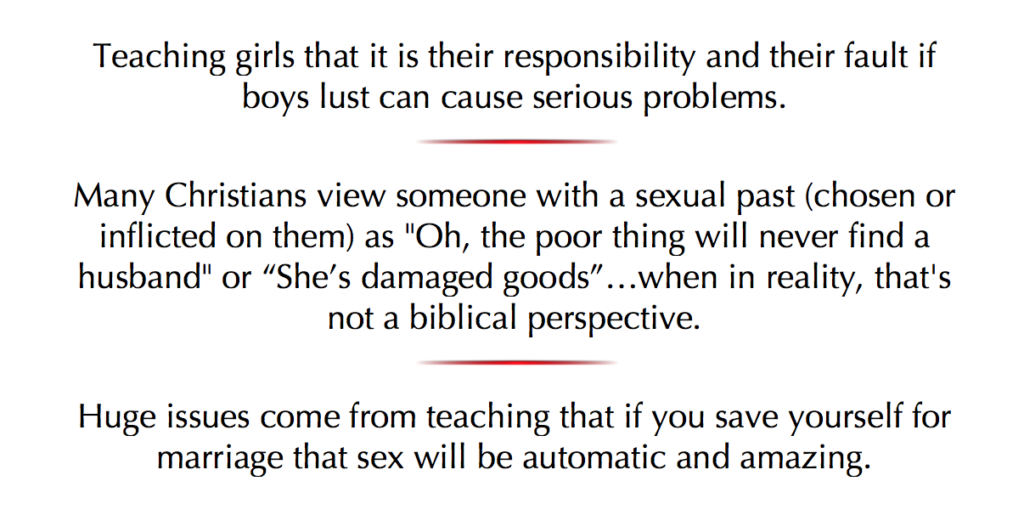
We tend to communicate that the Bible’s sexual standards are meant to control and demand, bludgeon and indict. And we reinforce the message with shame-talk.
Yet what the Bible instructs is actually benevolent—intended for our good. For a life with fewer regrets and burdensome consequences. For healthy relationships and a sense of “entirety.”
Reframing the Bible’s teaching about sex will change the conversation from “Don’t do this—or else…” (wagging a threatening finger) to “You’ll be grateful you didn’t—because…” (expressing God’s heart for their whole-person wellness).
Figure out how to put God’s protective instructions into words young minds can understand.
Speak of sex as a natural part of being alive in human bodies (it is) and do so often enough that raising the subject is easy and unembarrassing in your family culture.
Emphasize abstinence (if that’s the stance your faith informs), but be equally clear in stating that Jesus understands what it’s like to be living as humans. And speak of his ongoing, powerful, unconditional and never-disgusted-by-the-children-he-loves nature.
Please see THIS ARTICLE for much more on this topic.
If the message we send, sometimes without intending to, is that sex outside of marriage is the worst of sins and those who engage in it are unsalvageable, the likelihood of someone going to God, parents or anyone in the Christian world for comfort and guidance becomes incredibly slim.
There are too many MKs who live crippled by unspoken guilt and life-branding shame.
KNOW AND SPEAK OF: THE WORLD’S MESSAGING ON SEXUALITY
Sometimes, missionaries themselves are just as clueless as their children about what the world at large is communicating about sex. Adults too can fall into the passive comfort of not knowing enough.
Understand this: in vast parts of the world, sex has become foundational to social expectations and self-actuation.
We’ve started to regard those who haven’t been sexually active—whether by lack of opportunity or choice of abstinence—as socially stunted. I’ve spoken HERE about the commonly-held lie that for a person to be a whole, functional and fulfilled human being, he/she must be sexually active. More often than not, the person who is abstinent is viewed with a certain amount of condescension, disdain, or—worse—pity.
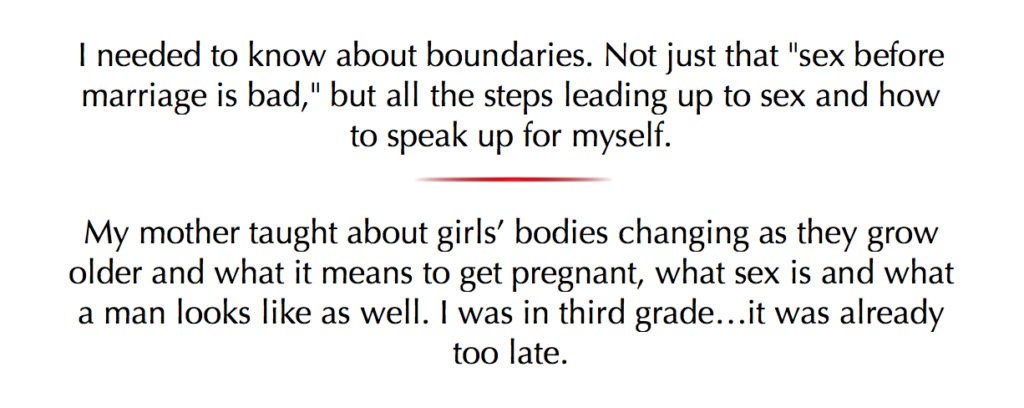
“What if I don’t know what the world is saying about sex because my circle of friends and acquaintances aren’t aware of it either?” you might ask.
It will take intentionality and effort. And your research must be comprehensive enough to cover all the cultures your children consider home—not just their passport culture or just their adoptive culture
Read. Interact. Search for articles and educational videos that explore the modern realm of sexuality. Be willing to be uncomfortable or offended for the sake of adequate preparation and knowledge. Absorbing information that takes different stances than yours is crucial to understanding the social and cultural mores influencing your children. If you don’t know where to find resources, talk to people who do—counselors, teachers, youth pastors, neighbors, doctors.
Consulting with those who might have a deeper understanding of cultural pressures and interpretations of sexuality will allow your own messaging to be more useful for your kids.
Lastly and importantly—know about pornography.
You’re not protecting anyone by ignoring the topic. Your kids have probably already seen some form of porn. The average age of exposure is eight. That’s third grade. There has been so much research done by mainstream news and science publications on the long-term consequences of porn consumption that there’s no excuse for being uneducated on this topic. Time Magazine itself, generally a socially liberal publication, made pornography the cover of its issue in April, 2016 (see HERE), because the detrimental side-effects of porn consumption are seen as such dangerous factors for society as a whole.
Porn is everywhere and your kids will not be able to circumvent it. Be the ones who speak about it first.
KNOW AND SPEAK OF: THE MECHANICS OF SEX
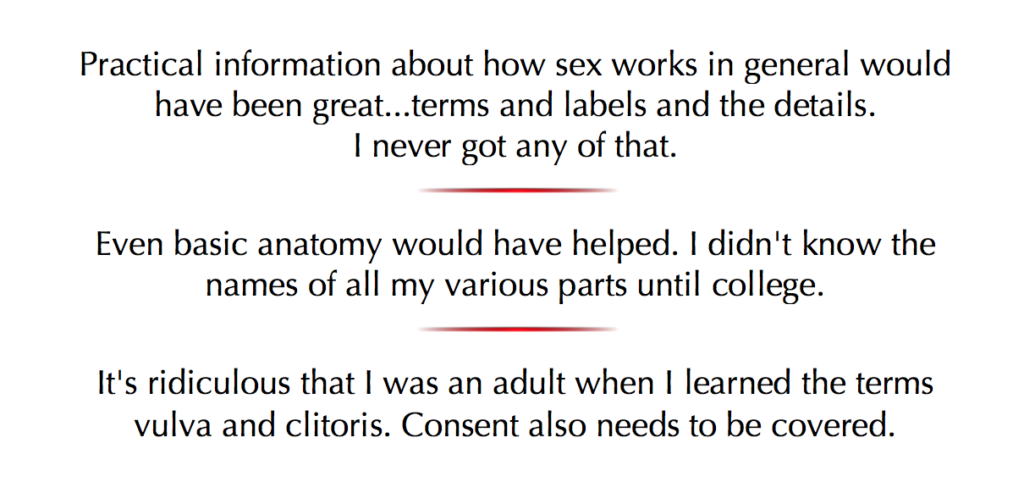 Believe it or not, I’m still meeting teens and adult MKs who have only a vague understanding of how sex works…or no understanding at all. They need to know more. Their safety is at stake.
Believe it or not, I’m still meeting teens and adult MKs who have only a vague understanding of how sex works…or no understanding at all. They need to know more. Their safety is at stake.
Make sure your children are completely comfortable with anatomical language.
At appropriate ages—which is likely much earlier than you think—teach them about more than just reproductive biology. They need to know (believe me) about arousal, hormones, periods, erections, masturbation, contraception, STIs, consent…and so much more.
These complex and intimate topics will undoubtedly be referenced in conversations your kids have with their peers starting at a young age and, once again, if they don’t learn truth from you, they’ll absorb lies from others.
KNOW AND SPEAK OF: OTHER FORMS OF SEXUALITY
I mentioned it above. There are too many Jesus-believing, God-following young people who have listened to traditional sex-talks and come away thinking that all they need to do to remain “good little Christians” is abstain from vaginal sex, thus preserving their physiological virginity.
They’ve resorted to equally intimate alternative sexual encounters, many of which have been normalized by a pornography-influenced culture.
Beautiful souls, vulnerable souls, are engaging in oral sex, anal sex, mutual masturbation and more—and thinking it isn’t a big deal, because the virginity they’ve been threatened or shamed into preserving is still intact. (Note: the hymen in the female body makes the emphasis on virginity much more burdensome for girls than for boys.) Since these alternative forms of sex are talked about openly and minimized by their peers, they can’t really be overly intimate…right? Wrong.
As parents, you need to know what is considered casual and harmless in your children’s spheres, so you can have informed, straightforward, preventative and empowering conversations with them before the world’s messaging becomes their primary moral compass.
KNOW AND SPEAK OF: MODERN TERMINOLOGY AROUND SEXUAL ACTS AND ORGANS
A sixteen-year-old girl was asked if she wanted to meet a couple of her male friends in the bleachers after school for a BJ. She said yes, assuming it was something innocuous—maybe a snack—and was flattered that someone in her class was finally wanting to spend time with her. What followed was an episode that mercifully left her physically unharmed, but took months of counseling and prayer to process. (If you don’t know what BJ stands for, please give careful consideration to the suggestion I’m making here.)
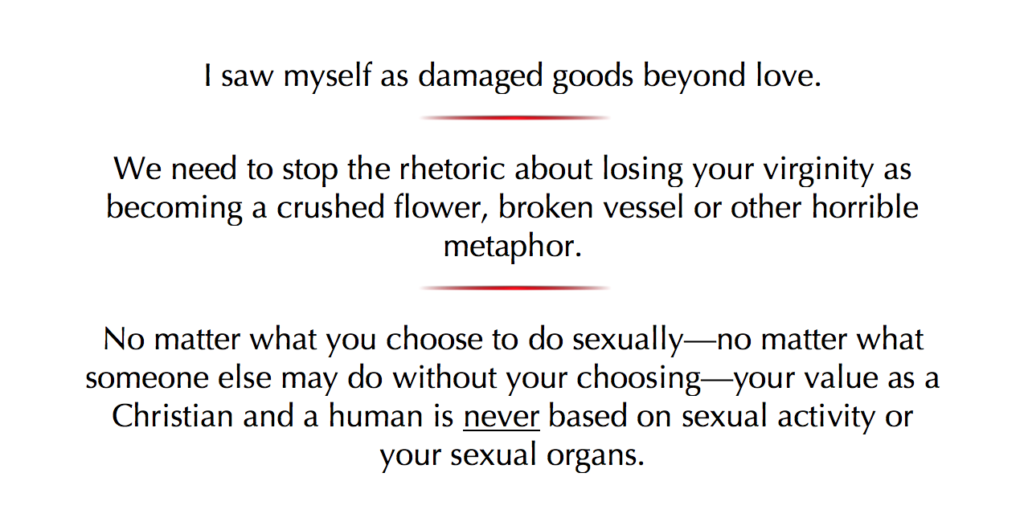
The danger with your children not knowing the slang and acronyms young people use for sexual acts is that they might agree to something they don’t understand. Or they might start using the terms in normal conversation and not realize what they’re actually saying. (I’ve seen it happen.) Or they might try to figure out what a word means by typing it into Google or Urban Dictionary. If they do that, they could be exposed to a minefield of graphics and videos you wouldn’t want them to see.
It would be much safer for them to learn the definition of unknown sexual words—even (especially) crass or crude terminology—from someone they trust who has their welfare in mind.
I have a far-from-comprehensive list of modern terminology and texting acronyms I can send to you as a first step. Just contact me if you’d like to receive it. For now, I’ll simply outline some categories of sexual language you may want to research to better protect your MKs.
- Slang words for sexual organs.
- Slang words for sexual responses.
- Slang words for sexual acts.
- Emojis and acronyms used in digital interactions, many of which are designed to look innocuous and leave parents in the dark.
Note: you likely won’t be able to familiarize yourself with all the terminology—it’s constantly evolving. There are more than sixty terms related to oral sex alone! But if you can at least equip your children to understand the most common of the words and expressions they hear, they’ll be better prepared to recognize the meaning of jokes and propositions.
KNOW AND SPEAK OF: MOLESTATION AND OTHER FORMS OF ABUSE
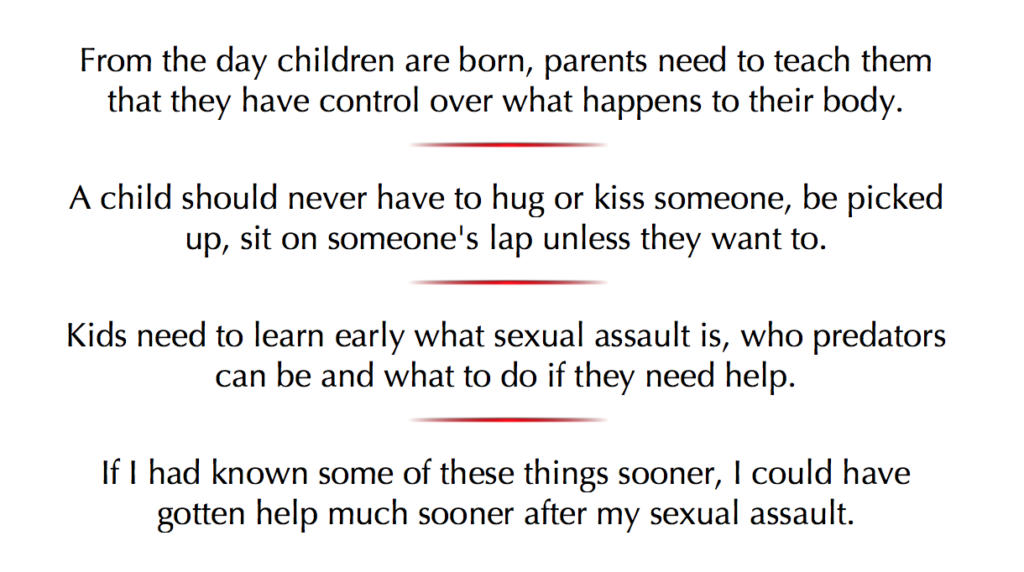
MKs are not immune to abuse. Sometimes, it’s overt and painful enough that they recognize it instantly. Sometimes it’s insidious, couched in a perverse form of “relationship” and more easily recognized in retrospect than in the moment. I’ve written much more on this topic in two related articles: Eight Steps for Preventing Abuse (for parents) and Speak It (for victims of abuse).
A very-brief summary is this:
- MKs need to know who abusers might be—strangers, friends, authority figures, family.
- They need to recognize warning signs and grooming tactics like manipulation, shaming, gaslighting, pressuring and secrecy.
- They need to know how to protect themselves—proceed with caution, trust their guts, assert their autonomy.
- They need to be empowered to report when something happens, no matter what mistakes or commitments they themselves may have made. No matter how much they may love the abuser. No matter how painful the consequences might be for the aggressor, the victim or their family… They can—they must—report the abuse.
They need to know that God aches for the victim and rages against the abuser.
He promises healing to the broken and justice to the aggressor.
AFFIRM AND DEMONSTRATE: SEXUAL ACTIVITY IS NOT A RELATIONSHIP-BREAKER
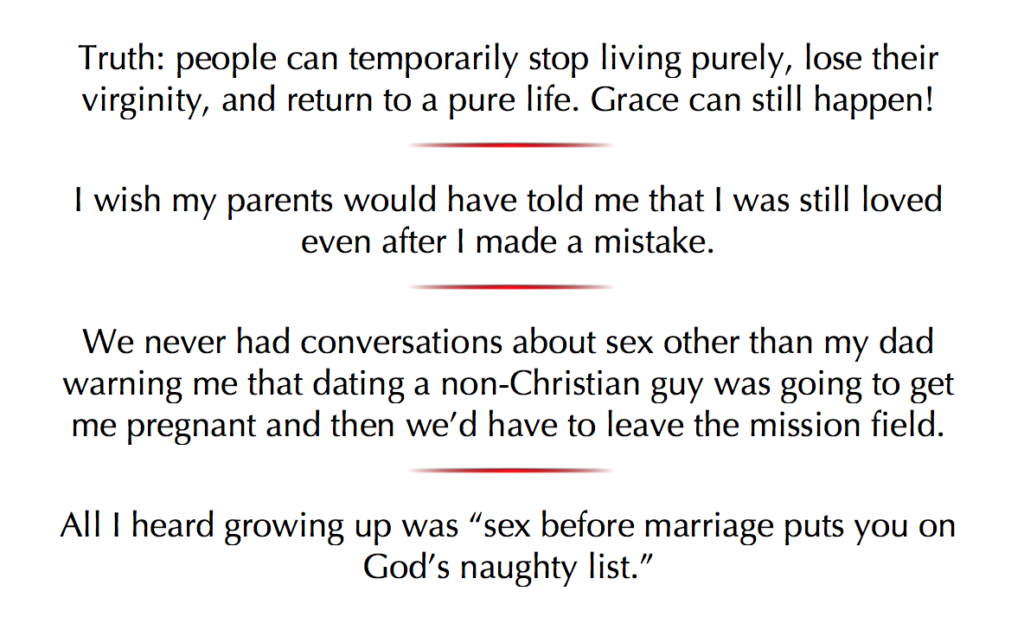
Children and teens (even adults) need to know that neither their parents nor God will turn their backs on them if they learn of missteps and mistakes. It is so devastating when this doesn’t happen.
Too many MKs have confessed to me that they’ve stayed silent with regard to their sexual experiences because they were sure that their parents would be disgusted with them and essentially walk away. Too many parents have never learned of the unspoken trauma that shaped the lives of their children in indelible ways because of this fear.
Kids need to know—from the earliest of ages—that you understand the temptations of growing up in hormone-driven bodies, that you pray they’ll have the wisdom and strength to maneuver the sexual minefields of their vulnerable lives, and that nothing they report to you will make you love them less fiercely.
Neither their sexual choices nor their victimization have the power to sever your heart for them or your commitment to them.
Perhaps most importantly, MKs need to know that God’s unlimited Grace means that their story doesn’t end with their mistakes. Life can be hard and poor decisions regrettable, but Jesus himself has given his children the gift of do-overs. He understands that following him and living according to his benevolent instructions might be a lifelong practice.
They are not stained beyond cleansing. They are not soiled beyond redeeming. They are not damaged beyond healing. They are still so very worthy of human and divine relationship—and capable of growing into a healthy sexuality.
God’s heart for them is unchanged by their choices. It beats with fierce protectiveness, unconditional forgiveness, and a love that is more all-encompassing, pure and hopeful than anything they can imagine.
~~~~~~~~~
You’ve made it to the end of the article—thank you. As you ponder all I’ve written above, I encourage you to consider how changes in the way you speak to your children about sexuality might affect their futures. I know that broaching some of these topics might feel painfully uncomfortable for some of you. I’d venture to say that what you’ll gain by wading into these murky waters—what you’ll do to ensure more preparedness and safety in your MKs’ lives—will far outweigh any discomfort it might cause.
Lack of sexual education has caused too much harm for young people growing up in a world where sexuality underscores every situation and conversation.
We can do better—we must do better.
Please join the conversation!
- Contribute your thoughts in the comments section below
- Use the social media links to Like and Share this article
- Many of these articles are now available in podcast form. Simply search for “Pondering Purple” on your usual pod platforms, or click this link to be taken to its host page.
- To subscribe to this blog, email michelesblog@gmail.com and write “subscribe” in the subject line
- Pick up Of Stillness and Storm (my novel about a missionary calling gone awry) on Amazon




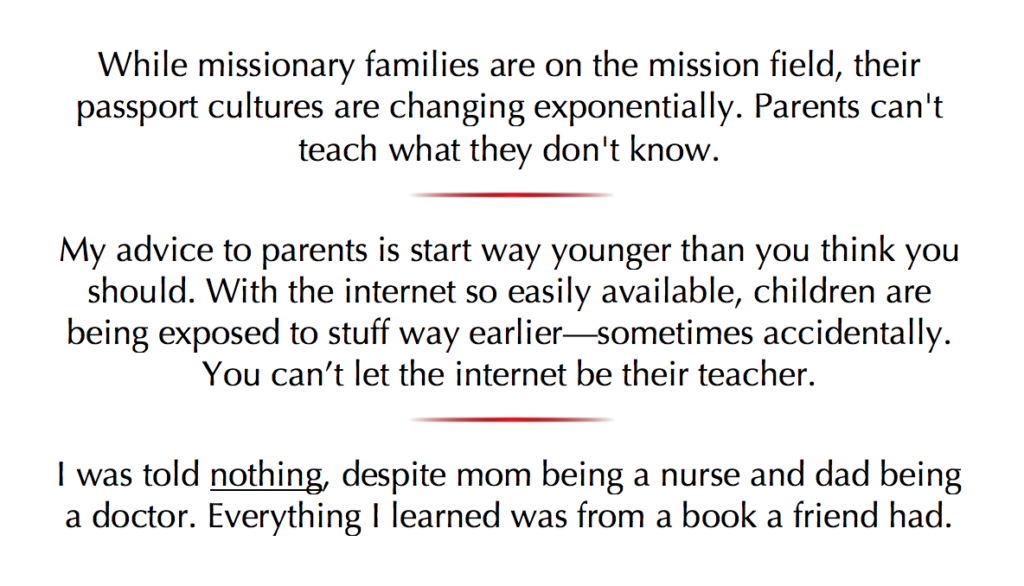
Dawn
Agree 100 percent. Great article and great advice. Love your emphasis on grace and am going to have more conversations on that. Would like a copy of your slang terms, I find they have evolved and changed since I was young.
Ruth Cleghorn
Really good article, Michele.
Vidhya
Thank you so much for writing this much needed article. I’m an MK myself, served as missionary for a couple of years and now , mother to 6. I hope this article reaches a very wide audience of MKs soon 🙂
From Facebook: Daniel Wiens
Yes, sex was always a taboo subject, both at home and at Black Forest Academy, the boarding school I attended in the mid 80’s. Unfortunately I then got addicted to porn for many years, and this lasted throughout many years of my marriage. But, by God’s grace, it’s been now 7 years that I have been freed from it, and now I lead a ministry to help people struggling with sexual sin. So, I can say, yes, it’s SO IMPORTANT that parents talk to their kids about sex at an early age!
C
This is so crucial! I moved to the United States with no understanding of sex or that not everyone has your best interests at heart. And I was preyed on again and again and again, learning a bit more each time but never enough to prevent the next occurance. Even when I got married I got no information about sex from my parents. A friend gave me a one-sentence piece of advice and then I went into my honeymoon armed only with the knowledge I had learned from movies and TV.
My spouse and I plan on making it a point to communicate openly with our children as they grow up so they can feel comfortable with the topic and talking about it. It is so important to us.